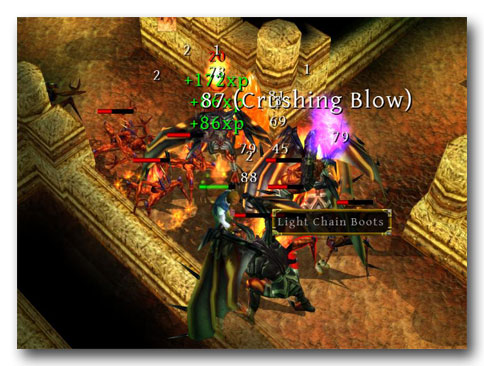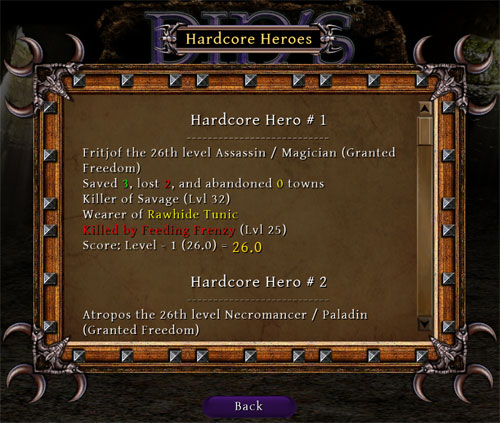Action RPGs tend not to be deep, complex games — a key factor of the subgenre’s appeal to many. They’re very easy to get into — if you can point your mouse cursor and left-click, you’re good to go — and aren’t especially taxing. Two hours of intense PvP action on a competitive FPS server will leave the average gamer frazzled; two hours into a Diablo-like, the player would be perfectly happy to spend more time to finish a few more quests for the next tantalising level-up ding. The mechanics are so simple, the decision-making so limited, the action so repetitive, most players can plough through these games almost on auto.
It helps a lot players aren’t normally penalised heavily for failure. Death is usually a trivial inconvenience less painful than a stubbed toe. There may be some minor loss of XP (which can be quickly recouped) and some retracing of steps to be done but these penalties are so insignificant there’s little incentive to stay sharp and focused while hacking and slashing through hordes of foes.
This is not to say Diablo-likes are completely devoid of challenge. There is challenge enough within them to satisfy even the most hardcore of the hardcore but players must actively seek them out. By increasing the difficulty levels and enabling the permadeath option, action RPGs can go from near-mindless comfort gaming to genuine tests of skill as encounters which are otherwise straightforward turn into epic heart-in-mouth struggles.
Unfortunately, few action RPGs encourage this. These games constantly reward with XP, level-up skill improvements and loot but provide very little incentive to ramp up the difficulty, leaving the player with only the daunting penalties that go hand-in-hand with greater challenges.
Permadeath, in particular, seems an unduly harsh punishment and all the more so given the hours a player might put into each character, carefully tweaking the build and kitting out the character with the best possible gear. For those who’ve never tried playing with permadeath enabled, it may seem a completely mystifying way to play, a choice for masochists and the foolhardy. There can be no avoiding death in action RPGs, only a delaying of the inevitable, so why deal with the frustration of permadeath?
Yet the greater the risk, the greater the intensity of experience and ultimately, the more rewarding success becomes. A level-up ding is satisfying in normal mode; with permadeath enabled, each level-up is a fist-pumping moment, hard-won and well-earned, a testament to skill and endurance. Still, that thrill will never be experienced unless there is proper inducement to give this high-risk style of play a try.
Din’s Hardcore
Din’s Curse by Soldak Entertainment may be the perfect hardcore action RPG. The unpredictability of its dynamic game world, the randomised dungeons and world modifiers, and its neat Hybrid class system make restarting with a new character much less off-putting compared to other action RPGs.
Din’s Curse is guaranteed to knock players out of the torpidity common to action RPGs once they’ve settled into a steady rhythm. Just when you think you have the game all figured out, the ground might give way causing you to drop down right amidst high level foes who quickly swarm all over you.

You might enter a town with no vendors, forcing you to rethink your tactics now that you no longer have a reliable source of healing items. Fleeing a deadly mob, you may reach a teleport gate only to find your usual escape route blocked by some Blots who have jammed the teleport system. Even in its normal mode, the game will keep you on your toes.
(On the downside, the dynamism and unpredictability of the game can result in some of the most embarrassing permadeaths of any action RPG. Public service announcement: stay clear of barrels.)
Din’s Valhalla
One of the neatest aspects of Demon War, the Din’s Curse expansion currently in beta, is players are finally given some encouragement to try the game’s Hardcore mode.
For starters, there’s a new Semi-Hardcore mode, which is essentially Hardcore mode with training wheels on.

This is obviously meant to gently ease those who find permadeath too intimidating into Hardcore mode.
The expansion also introduces 51 achievements to unlock, four of which are Hardcore-specific. However, as any Din’s Curse player will tell you, having an eight-hour-old Hardcore character still defiantly standing up to the horrors from the deep is achievement enough.
The greatest encouragement for Din’s Curse Hardcore mode players, though, is a high score table called Hardcore Heroes which lists the 10 best Hardcore characters. Much like the classic Microprose hall of fames and high score tables seen in games like Pirates!, Railroad Tycoon and Civilization, the Din’s Curse Hardcore Heroes table provides both recognition for the player’s past achievements and a clear marker for improvement.

The Hardcore Heroes table itself could do with some improvement, however. There needs to be a better way of calculating the score which determines how characters are ranked. Currently, it appears to be simply a matter of subtracting one from the character level which means a Level 26 character who’s 40 per cent of the way to the next level would be awarded a score of 25.4.
Unfortunately, this doesn’t fully take into account difficulty and handicaps. A Hardcore player adventuring on less challenging settings (e.g. against monsters of a much lower level on a slow-paced world) could have a much easier time achieving the same score as players taking on a greater challenge and this runs counter to the whole point of encouraging and rewarding players who undertake greater risks.
The easiest way to remedy this is to award bonus XP or score points for taking on additional handicaps. More XP means faster levelling which in turn results in a better score. Currently, only increasing the pace (which basically dictates how quickly everything goes to hell) results in bonus XP being awarded. Playing on a Very Fast Pace world, for instance, nets the player an additional 20 per cent XP.
In a similar vein, the player who makes every attempt to save towns ought to be better rewarded than the player who immediately abandons towns at the first sign of trouble. After all, the God of Honour would not look kindly upon those who dishonourably turn their backs on townsfolk in great need. Adding a point to the score for every town saved and deducting a point for every town abandoned ought to provide the right sort of incentive to players.
The few, the brave
It must be noted these are all incentives that only a very small set of the playerbase will appreciate. The hardcore player who delights in games as tests of skill is undoubtedly part of a tiny niche these days, being increasingly marginalised as mainstream gaming removes barriers to accessibility by making everything easier, safer, blander and more palatable to the masses.
But this is precisely how smaller independent developers can really shine. They can (and perhaps must) cater to niches poorly served by major developers. Soldak, in particular, has been very attentive to its customers. Despite limited resources, Soldak has been outstanding with its post-release support, constantly improving the game and even crediting its customers for suggestions in the patch notes.
It’s therefore a little disappointing neither the developer nor the game are getting more attention from the gaming demographic who would best appreciate them. It would seem the greatest challenge facing Soldak is getting the word out to the hardcore: here is the action RPG for you.

awesome, I *love* hardcore / permadeath